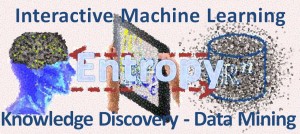Call for Papers Special Issue in Entropy (ISSN 1099-4300, IF (2013): 1.564) OPEN ACCESS
Machine Learning and Entropy:
Discover Unknown Unknowns in Complex Data Sets
Manuscript Submission Deadline: 30 January 2016 (enjoy the Christmas season)
Guest Editor: Andreas Holzinger <expertise>
Affiliation: Medical University Graz and Graz University of Technology, Austria
E-Mail: a.holzinger@human-centered.ai
Interests: Interactive Machine Learning, Knowledge Discovery, Entropy-based Data Mining
Summary: In the real world, we are confronted not only with complex and high-dimensional data sets, but usually with noisy, incomplete and uncertain data, where the application of traditional methods of knowledge discovery and data mining always entail the danger of modeling artifacts. Originally, information entropy was introduced by Shannon (1949), as a measure of uncertainty in the data. Up to the present, there have emerged many different types of entropy methods with a large number of different purposes and possible application areas. In this special issue we are seeking papers discussing advances in the application of learning algorithms and entropy for the use in knowledge discovery and data mining to discover unknown unknowns in complex data sets, e.g. for biomarker discovery in biomedical data sets.
Keywords: Machine Learning, Knowledge Discovery, Entropy-based Data Mining
Journal Special Issue page: https://www.mdpi.com/journal/entropy/special_issues/machine-learning
Submission: Manuscripts should be submitted online directly via the Journal homepage (see link above):
First log-in (or register if you are a first time author), then click the “sumit my manuscript” button – follow the submission form.
Manuscripts can be submitted until the deadline. Papers will be reviewed by at least three independent reviewers and published continuously as soon as accepted and will be listed together on the special issue website. Research articles, review articles as well as communications are invited.
Submitted manuscripts must not have been published previously, nor be under consideration for publication elsewhere (except conference proceedings papers, where the authors explicitely state that it is an expanded version and ensure that at least 30 % new material is inlcuded).



